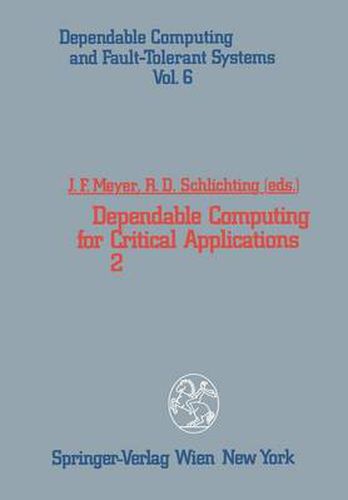Readings Newsletter
Become a Readings Member to make your shopping experience even easier.
Sign in or sign up for free!
You’re not far away from qualifying for FREE standard shipping within Australia
You’ve qualified for FREE standard shipping within Australia
The cart is loading…






This title is printed to order. This book may have been self-published. If so, we cannot guarantee the quality of the content. In the main most books will have gone through the editing process however some may not. We therefore suggest that you be aware of this before ordering this book. If in doubt check either the author or publisher’s details as we are unable to accept any returns unless they are faulty. Please contact us if you have any questions.
This volume contains the papers presented at the Second International Work ing Conference on Dependable Computing for Critical Applications, sponsored by IFIP Working Group lOA and held in Tucson, Arizona on February 18-20, 1991. In keeping with the first such conference on this topic, which took place at the University of California, Santa Barbara in 1989, this meeting was like wise concerned with an important basic question: Can we rely on Computers? In more precise terms, it addressed various aspects of computer system de pendability, a broad concept defined as th'e trustworthiness of computer service such that reliance can justifiably be placed on this service. Given that this term includes attributes such as reliability, availability, safety, and security, it is our hope that these papers will contribute to further integration of these ideas in the context of critical applications. The program consisted of 20 papers and three panel sessions. The papers were selected from a total of 61 submissions at a November 1990 meeting of the Program Committee in Ann Arbor, Michigan. We were very fortunate to have a broad spectrum of interests represented, with papers in the final program coming from seven different countries, representing work at universities, corporations, and government agencies. The process was greatly facilitated by the diligent work of the Program Committee and the quality of reviews provided by outside referees. In addition to the paper presentations, there were three panel sessions or ganized to examine particular topics in detail.
$9.00 standard shipping within Australia
FREE standard shipping within Australia for orders over $100.00
Express & International shipping calculated at checkout
This title is printed to order. This book may have been self-published. If so, we cannot guarantee the quality of the content. In the main most books will have gone through the editing process however some may not. We therefore suggest that you be aware of this before ordering this book. If in doubt check either the author or publisher’s details as we are unable to accept any returns unless they are faulty. Please contact us if you have any questions.
This volume contains the papers presented at the Second International Work ing Conference on Dependable Computing for Critical Applications, sponsored by IFIP Working Group lOA and held in Tucson, Arizona on February 18-20, 1991. In keeping with the first such conference on this topic, which took place at the University of California, Santa Barbara in 1989, this meeting was like wise concerned with an important basic question: Can we rely on Computers? In more precise terms, it addressed various aspects of computer system de pendability, a broad concept defined as th'e trustworthiness of computer service such that reliance can justifiably be placed on this service. Given that this term includes attributes such as reliability, availability, safety, and security, it is our hope that these papers will contribute to further integration of these ideas in the context of critical applications. The program consisted of 20 papers and three panel sessions. The papers were selected from a total of 61 submissions at a November 1990 meeting of the Program Committee in Ann Arbor, Michigan. We were very fortunate to have a broad spectrum of interests represented, with papers in the final program coming from seven different countries, representing work at universities, corporations, and government agencies. The process was greatly facilitated by the diligent work of the Program Committee and the quality of reviews provided by outside referees. In addition to the paper presentations, there were three panel sessions or ganized to examine particular topics in detail.